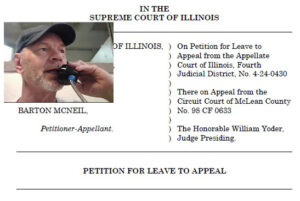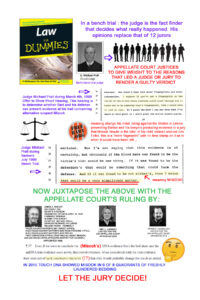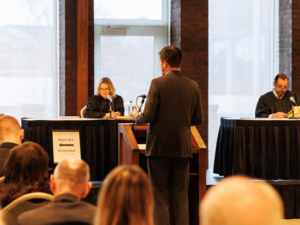2018 Oct 17 News Article – Challenging wrongful convictions can take decades

Edith Brady-Lunny | Oct 17, 2018
BLOOMINGTON — When Bart McNeil insisted police return to his home following the death of his 4-year-old daughter in June 1999, he believed the information he wanted to share could help authorities find his child’s killer.
McNeil’s theory that someone may have crawled through his daughter’s bedroom window and killed her included the name of a potential suspect: his former girlfriend Misook Nowlin. Bloomington police detectives had another theory that involved McNeil as the perpetrator.
McNeil’s ongoing challenge to his murder conviction was one of two local cases discussed Tuesday by panelists for Illinois Wesleyan University’s event “Wrongful convictions? The pursuit of justice in Illinois.”
The panel included Curtis Lovelace, a Champaign attorney who was exonerated in 2017 of murder in the death of his first wife; Tammy Alexander, co-founder of Justice for Illinois’ Wrongfully Convicted; Tara Thompson, an attorney with the University of Chicago’s Exoneration Project; and Willis Kern, co-host with Scott Reeder of Suspect Convictions, a podcast on the McNeil case.
The event held at the Hansen Student Center on the Bloomington campus was organized by Amanda Vicary, associate professor of psychology at IWU.
The second case examined by the panel involved Jamie Snow, who was convicted of the 1991 killing of Bill Little, an attendant at a Bloomington gas station, during a robbery.
Snow’s defense is seeking a hearing on potential new evidence in his case, said Thompson, his lawyer for 10 years.
“We’ve been fighting in the courts for a decade. Jamie wants an opportunity to present evidence to the court that he’s innocent,” said Thompson.
Snow is also trying to secure additional DNA and ballistics testing on evidence, said Thompson.
Lovelace described his two years spent in jail waiting for his first trial that ended with a hung jury.
As a former prosecutor, Lovelace endured taunts from some inmates. He also saw the other side of the legal system.
“I really got a feel for how desperate people were to have contact with their attorneys,” said Lovelace, who works to help others seeking a review of their convictions.
Kern said an innocence claim is much harder to prove after a conviction.
“You’re guilty until proven innocent” after the trial, said Kern, a retired news director of WGLT.
Alexander said her organization supports families of wrongfully convicted defendants. Delays in getting permission for new forensic testing can be costly to defendants, said Alexander.
“Everybody needs to pay attention to that. It could be you next,” said Alexander, who lives in Tennessee.
This year marked the first time the number of years lost to incarceration as a result of wrongful convictions topped 20,000, according to a report from the National Registry of Exonerations. The registry includes 2,265 exonerees, with 237 from Illinois and four from McLean County.
The average amount of time spent behind bars before release is 8 years and 10 months.




